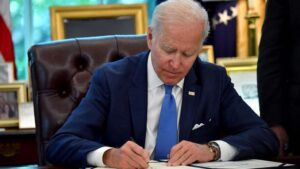
The National Interest Foundation Newsletter
Issue 234, April 26, 2024
Welcome to our NIF Newsletter. This week, we look into how Israeli officials have vowed to escalate in Gaza after the passage of more U.S. military aid, analyze the hypocrisy behind efforts to suppress anti-war free speech, and examine President Biden’s signing of a massive foreign aid package while U.S. poverty rates are on the rise.
Israeli Officials Vow to Escalate in Gaza After the Passage of More U.S. Military Aid

The pledge to escalate comes amid the deeply disturbing recent discovery of mass graves at the two main hospitals in Gaza. (Photo from AFP)
Israeli Officials Vow to Escalate in Gaza After the Passage of More U.S. Military Aid
Israeli officials have recently vowed to escalate their military operations in Gaza following the passage of a foreign aid bill that provides $26.4 billion in military support to Israel. Prime Minister Benjamin Netanyahu applauded its approval, and rather than heed repeated pleas from the United States and others to scale back the increasingly criticized Israeli military offensive and provide essential humanitarian aid to civilians in Gaza, Netanyahu instead pledged to further escalate. This is at a time when regional tensions are already high. Additionally, the remarks come amid the backdrop of both the universally denounced planned Israeli assault on the southern Gaza border city of Rafah, where more than 1.5 million Palestinian civilians are sheltering, and the extremely troubling recent discovery of mass graves at the two main hospitals in Gaza. A potential Israeli attack on Rafah would be devastating and exacerbate the already dire humanitarian crisis in Gaza, according to multiple human rights organizations, U.S. officials, and other world leaders. President Biden and members of his administration have repeatedly warned Israel against invading the city, but Netanyahu has been defiant and stated that the military seeks to escalate its tactics in targeting and destroying Hamas – a task that many experts contend is folly and not feasible.
Regarding the foreign aid bill that provides more military funds to Israel, there were 21 Republicans and 37 Democrats that voted against it. Around 20 of these Democrats signed a statement, saying that “Netanyahu appears willing to sacrifice the hostages while inflicting extraordinary suffering on the people of Gaza…most Americans do not want our government to write a blank check to further Prime Minister Netanyahu’s war in Gaza.” One of the main reasons that this group voted in opposition to the bill is that they were very concerned that the supplying of offensive weapons to Israel “could result in the killing of more civilians,” an underlying issue for many voters, particularly amongst the Democratic Party. There is a belief among human rights and peace activists that the United States is providing arms to Israel that will be used against the best interests of the U.S., as Israel has already used these offensive weapons to indiscriminately kill a heinous number of civilians in Gaza while also striking Iranian targets, risking inflaming tensions with Iran. Israel’s reckless and abusive actions risk increased U.S. involvement in the Middle East as well, a role that the Biden administration has consistently stated it wants no part in due to the costly and destructive nature of a military campaign there.
The recent discovery of mass graves at the hospitals in Gaza only adds to the growing outrage regarding Israel’s military offensive and how it is using its arsenal of weapons. The White House even expressed recently that it “wants answers” from Israel on the disturbing uncovering. The discovery also prompted the United Nations to demand an independent probe into it. Hospital sites, like other types of non-combatant infrastructure, are supposed to be protected from attack under international law but Israel has repeatedly been found to engage in the indiscriminate bombardment of these facilities. UN Human Rights Chief Volker Turk outlined that “Hospitals are entitled to very special protection under international humanitarian law…and the intentional killing of civilians, detainees, and others who are non-combatants is a war crime.” Officials from Amnesty International commented that the discovery of the mass graves highlights the urgent need to grant access to independent human rights investigators.
Ultimately, there is an array of evidence which sheds light on Israel’s track record of committing human rights violations, making the passage of the Israeli military aid bill all the more troublesome. In fact, ironically, despite its passage, the United States is expected to sanction the Netzah Yehuda battalion of the Israel Defense Forces (IDF). The unit has been frequently accused of egregious human rights violations in the illegally-occupied West Bank, even well before the onset of Israel’s destructive War on Gaza. The impending sanction move would be significant, as it would mark the first time that the United States imposes them on an Israeli military unit. It would add further weight to those pushing for the U.S. to abide by the Leahy Law, which prohibits U.S. foreign aid and training programs from going to military, security, and police units that are credibly alleged to have committed human rights abuses. The potential decision to sanction the IDF battalion may also open the door for other IDF units to be punished as well. Israeli officials have claimed that their military operations “are carried out according to international law,” however, if that was indeed the case, then they certainly would not be under any threat of being sanctioned or facing surging global condemnation for their pattern of war crimes and human rights abuses.
The Hypocrisy Behind Efforts to Suppress Anti-War Free Speech

Social justice and free speech advocates have long lamented conflating fair criticism of the Israeli government with antisemitism. (Photo from The New York Times)
The Hypocrisy Behind Efforts to Suppress Anti-War Free Speech
In response to growing outrage regarding Israeli human rights violations in Gaza, anti-war demonstrations have sprung up at universities across the United States. These have been particularly notable at schools in states such as New York, California, Connecticut, Massachusetts, and Michigan, including Columbia University, New York University, the Massachusetts Institute of Technology, Yale University, Harvard University, Stanford University, and the University of Michigan. Many of the student coalitions and groups that have been taking part in the overwhelmingly peaceful rallies have conveyed disappointment at the distorted media coverage, stating that they are “frustrated by media distractions focusing on inflammatory individuals who do not represent” the movement, with these instigators often being non-students detracting away from the majority. Doing so paves the way for a system of collective punishment, whereby students who are lawfully exercising their right to freedom of expression in order to draw attention to an ongoing injustice are unfairly targeted and suppressed based on the alleged actions of a few. They have also pointed out that the main threat posed to the safety of students at these universities is the harassment and intimidation tactics used by school and security officials, not the solidarity gatherings themselves. As such, prominent social justice advocacy organizations like Jewish Voice for Peace (JVP) have accused some university officials of creating a climate of repression and harm for students peacefully protesting for an end to Israeli human rights abuses against Palestinians in Gaza.
The clamping down and suppressing of anti-war free speech is a theme that is commonly observed, and this has only become more apparent since the onset of the War on Gaza back in October. Among those in academia, both students and faculty face resistance for speaking out against injustices towards Palestinians. This suppression is problematic, as it runs counter to standards of academic freedom and the rights of free speech and expression. There have been numerous instances of people in this sector being blacklisted, fired from jobs, having job offers rescinded, or losing out on other opportunities – all for merely exhibiting support for Palestinian human rights. In one high-profile recent case, the University of Southern California (USC) announced that it decided to cancel the commencement speech of its 2024 valedictorian Asna Tabassum. The move was made under the guise of “unspecified safety concerns,” but was clearly due to Tabassum’s pro-Palestinian online advocacy. In the aftermath of the decision, hundreds of students and faculty members have taken part in peaceful marches on campus opposing it, and a petition calling on USC to reinstate Tabassum’s speech has garnered over 40,000 signatures.
One of the most widely-used forms of censorship related to the issue, the labeling of legitimate and justifiable criticism towards the Israeli government’s actions as antisemitic is inaccurate and dangerous, because it is used as a tool to shield Israel from fair rebuke by suppressing anti-war free speech. Furthermore, it disregards the diverse nature of the voices that are speaking out in support of human rights, which includes an array of citizens from various ethnic, cultural, and religious backgrounds. In fact, a large number of those participating in the anti-war and pro-human rights solidarity demonstrations, on college campuses and elsewhere, are young Jewish Americans. Valid criticism of Israeli war crimes and human rights abuses is not the sole thing that can quickly elicit accusations of antisemitism – so do rally chants as well. While human rights activists highlight that the chant “from the river to the sea” merely expresses a desire for Palestinian dignity and recognition, biased defenders of Israel claim that it advocates for its destruction. Impartial experts point out that the phrase is simply a call for the dignity and full civil rights of Palestinians, and thus labeling it as antisemitic in any way is inaccurate. There is also a blatant double standard when it comes to focus on the phrase, as Israel’s Likud party platform literally demands that “between the sea and the Jordan there will only be Israeli sovereignty,” yet this does not get criticized in the same manner.
Despite the attempts to suppress and discourage anti-war free speech, it is heartening to see the sheer volume of principled citizens who continue to try and draw attention to injustices against Palestinians. This is evident in the ever-increasing number of students at colleges throughout the country that are standing up for Palestinian rights. Inspired by ongoing demonstrations at other schools and the burgeoning momentum of the solidarity movement, students are gathering on campuses by the hundreds and calling on their universities to cut ties with companies that are contributing to Israeli human rights violations in Gaza. Among their aims are for entities to halt doing business with military weapons manufacturers that are supplying arms to Israel. All told, the expanding prevalence of the anti-war protests and rallies, even in the face of various forms of intimidation, shows the extent of the deepening discontent with Israel’s destructive War on Gaza.
President Biden Signs a Massive Foreign Aid Package While U.S. Poverty Rates Rise

Some have decried sending such an enormous amount of money for foreign military aid purposes at the expense of trying to address domestic challenges. (Photo from Getty Images)
President Biden Signs a Massive Foreign Aid Package While U.S. Poverty Rates Rise
This week, President Biden signed a huge $95 billion foreign aid package for Ukraine, Israel, and Taiwan, that includes further weapons for Israel as it continues its more than six-month War on Gaza. The military aid to Israel component of the bill is especially questionable at a time when it faces serious and credible accusations of human rights violations, but on top of concern regarding certain elements of the aid package, sending such a massive amount of money for foreign purposes while significant domestic challenges exist such as rising U.S. poverty rates is also worth critiquing. Late last year, subject matter experts reported that the U.S. poverty rate saw its largest one-year increase in history, jumping a whopping 5 percentage points. Additionally, child poverty was found to have more than doubled from the year before, according to the most recent data. Analysts highlight that the United States had experienced notable improvements in poverty reduction during the preceding two years prior to last year’s figures. One of the main reasons for the shift was that safety net programs like expanded child tax credits had lifted millions of Americans out of poverty and provided critical assistance to low-income households, and as these types of programs were allowed to expire, poverty rates began to rise again.
Economists have outlined that child poverty in the United States would have been nearly 50% lower in the most recent year of data if these safety net programs had remained in place. Researchers have also found that these mechanisms had a serious and direct impact in both poverty reduction and poverty severity levels. The progress that had been made towards lifting children out of poverty in the early days of the Biden administration has slowed down, as has governmental support for finding child care. Furthermore, data shows that low-income Americans are even worse off financially than they were at the height of the Covid crisis back in 2020 and 2021. To help explain all of this, observers assert that too often, some lawmakers seem to be more concerned with foreign aid spending than government spending on domestic programs. As such, they point to the fact that American social programs are in need of funding – money that frequently ends up being prioritized in foreign aid packages and legislation. Thus, social spending tends to get squeezed out while large proportions of the overall budget are designated for military programs and usage. This has prompted some lawmakers to urge that Congress stop funneling taxpayer dollars into a revolving door of endless wars, and instead give precedence to investing in addressing domestic concerns.
Lawmakers and government officials have long sought to find a balance between oversized government and a shortage in vital programs and resources. Along with this, there is also the important task of weighing foreign expenditures with domestic ones, and it is no surprise that more of the former can have a detrimental impact on the latter. It is reasonable to suspect that at least some of the billions of dollars in foreign military aid and assistance provided on a regular basis, a small portion of which would amount to a hefty chunk, might be better administered to address domestic challenges here at home. This is particularly true when there is growing outcry regarding the abusive manner in which that foreign military aid is being used, hence Israel’s actions in Gaza. With respect to the recently signed foreign aid package, one can make the case that while the military support for Ukraine and Taiwan would be used for defensive purposes, Israel is waging a military offensive on Gaza that has killed tens of thousands of civilians, decimated the enclave, resulted in a deplorable humanitarian crisis, and elicited increasing criticism here in the United States and around the world.
